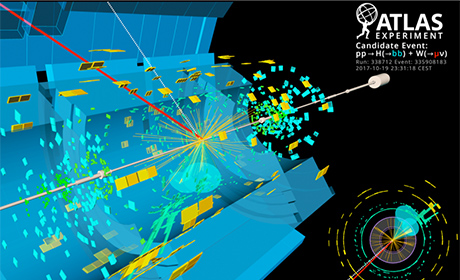CERN: New Decay of Higgs Boson Discovered
29. August 2018
Heidelberg physicists make significant contributions to the ATLAS experiment

Source: ATLAS/CERN
Two research teams at the Large Hadron Collider (LHC) – the world's largest and most powerful particle accelerator – have at last been able to observe the Higgs boson decaying into two so-called bottom quarks. One shortly after the other, the ATLAS and CMS experiment groups announced this major discovery from the world of elementary particle physics. Researchers from Heidelberg University were among those from Germany who made major contributions to the work at the CERN European Organization for Nuclear Research in Geneva. The bottom quark is one of the fundamental components that make up matter.
Theorists have long predicted the decay of the Higgs boson into bottom quarks. Although this decay channel is quite frequent, the researchers were only now able to definitively trace the particle fragments back to the Higgs particle. This reaction cannot be observed directly, so instead the researchers reconstruct the decay products of the particle collisions in the LHC using highly precise detection instruments. For this they used modern hardware along with powerful machine-learning techniques.
German groups made major contributions to the data analysis. They are involved in this research on elementary particle physics via projects financed by the Federal Ministry of Education and Research (BMBF), the Helmholtz Association and the Max Planck Society. In the ATLAS and CMS experiments, work is focused on further developing detector components, establishing new analysis methods, and providing complex algorithms for research at the LHC. Researchers from the Kirchhoff Institute for Physics and the Institute for Physics of Heidelberg University are members of the ATLAS experiment.
The research groups of Prof. Dr Hans-Christian Schultz-Coulon and Prof. Dr André Schöning are responsible for the development and operation of crucial elements of the so-called ATLAS trigger that preselects the reactions generated in the LHC to be recorded. In addition, both teams have pivotal roles in detector operation, calibration and data analysis. “The successful verification of this new, long-predicted Higgs decay mode is the result of painstaking and meticulous work of numerous researchers around the world; they are all justifiably proud of these recent findings,“ states Prof. Schultz-Coulon, former national contact and spokesperson of the German ATLAS groups.

